Have you ever explored the numerous opportunities available using stock warrants? Probably Not!
Virtually everyday in the news with companies reporting a stock offering, either a private placement or a public offering, more often than not, stock warrants are attached to the offering.
As well, you have probably seen articles about Warren Buffett and Carlos Slim with their personal investments involving stock warrants.
My message for you today is that stock warrants are seen daily in the news and whether you will ever buy or sell warrants yourself, you need to understand what they are and the advantages that stock warrants can bring to your portfolio.
But first we need to briefly discuss the overall market environment. These markets are getting very volatile whether you are investing in the resource sector with gold, silver or the shares or if you are investing in the Dow Jones Industrial Average, S&P 500 or the NASDAQ, so let’s look at a few charts which tell the story of volatility, starting with the strength in the US Dollar.
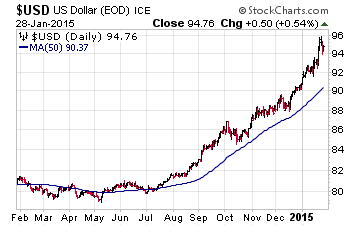
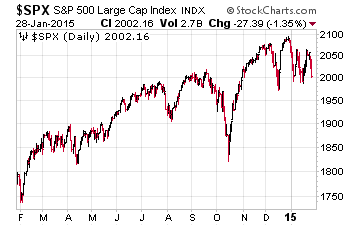
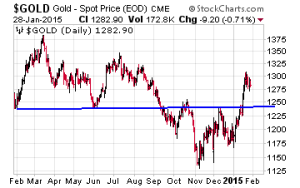
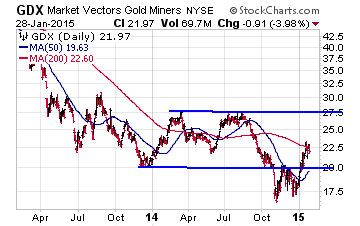
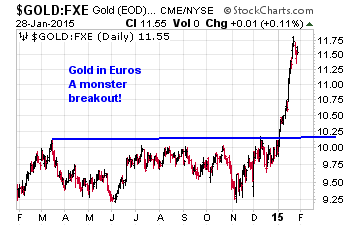
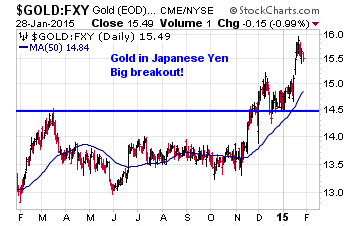
Stock Warrants versus Call Options
A warrant is a security issued by a company giving the holder the right, but not the obligation, to acquire the underlying company’s shares at a specific price. That right expires on a specific date in the future. Generally, warrants are issued in connection with a stock or a bond offering. Frequently, they are done so in the context of an “equity kicker” or “sweetener.” The reason a company will issue a warrant is simple; think of it as additional incentive to get the deal done.
There is an obvious similarity to call options. The two instruments are closely related. The major difference is that a call option is created in the marketplace by investors and not issued by a company. Typically, options trade on designated options exchanges, such as the Chicago Board Options Exchange. Warrants will trade on a traditional stock exchange, such as the New York Stock Exchange, NASDAQ or the Toronto Stock Exchange, just like their common shares.
Warrants first came about in the 1920s. At one time, even AT&T Inc (NYSE:T) had warrants trading, as well as some of the big company names of the past and present: Tenneco Inc (NYSE:TEN), Avcorp Industries Inc. (TO:AVP), Holiday Inn, International Tel & Tel, Lowes, General Tire & Rubber, Mack Trucks and many more.
Fast forward to today, and you will discover that many stock warrants are trading on the shares of banks & financial service companies, as well as companies in biotechnology, autos, restaurants, oil & gas, pipelines and of course on natural resource companies, an area in which many readers have a special interest. With the possibility of the lows being behind us in gold and silver, the opportunity for extraordinary gains in resource shares and/or the long-term warrants on those shares look interesting.
TRADER OBJECTIVE The first step in trading stock warrants is selecting the right underlying company. This is of utmost importance because if the company does not execute on its business plan and the common shares do not rise, holders of either call options or warrants will not make money. Each investor must perform his or her own due diligence on companies that are attractive for investment.
The next consideration is your time horizon.
Are the markets in a bull market or a bear market and how much time do you want to execute on your investment objective?
Once a viable company is selected, the decision to purchase a warrant or a call option will depend on the timeframe of the trader’s goals. While traditional call options generally have a life of between 30 days and one year, warrants often are issued with two to five years until expiration. Thus, short-term traders may see more opportunity in call options, while longer-term investors may be more comfortable with the several years until expiration that warrants provide. This additional time can be a great asset as in the volatile markets we have experienced over the last few years. Investors can also consider LEAPS, Long-Term Equity Anticipation Securities that typically have a maximum life of two years and trade on the Chicago Board Option Exchange, CBOE.
Whether the investor is considering call options or warrants, the underlying reason is basically the same: increased leverage. Both warrants and options offer additional leverage over purchasing a stock outright. Of course, as with all forms of leverage, the leverage afforded by warrants cuts both ways.
When it comes to warrants, traders can expect to achieve at least a two-to-one leverage over purchasing the common shares; this is reasonable with most of the warrants currently trading. What this means is if you believe the common shares will rise 100%, then the warrants have the potential to increase by at least 200%.
In addition to speculative or investment opportunities, warrants can also provide hedging benefits. When combined with both put and call options, warrants also can be used to construct some rather interesting, sophisticated and potentially profitable trading strategies.
Disclosure: Neither Dudley Pierce Baker nor CommonStockWarrants.com is an investment advisor and any reference to specific securities does not constitute a recommendation thereof. CommonStockWarrants.com is an online newsletter providing complete details on all stock warrants trading in the United States and Canada. The information and opinions expressed should not be construed as a solicitation to buy and securities mentioned.
